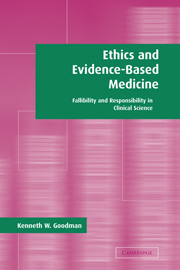Book contents
- Frontmatter
- Contents
- Preface
- Acknowledgments
- 1 Foundations and history of evidence-based practice
- 2 The research synthesis revolution
- 3 Evidence of evidence, and other conceptual challenges
- 4 Human subjects, the Internet, databases, and data mining
- 5 Evidence at the bedside
- 6 Public health policy, Uncertainty, and genetics
- 7 Ethics and evidence
- References
- Index
Preface
Published online by Cambridge University Press: 29 September 2009
- Frontmatter
- Contents
- Preface
- Acknowledgments
- 1 Foundations and history of evidence-based practice
- 2 The research synthesis revolution
- 3 Evidence of evidence, and other conceptual challenges
- 4 Human subjects, the Internet, databases, and data mining
- 5 Evidence at the bedside
- 6 Public health policy, Uncertainty, and genetics
- 7 Ethics and evidence
- References
- Index
Summary
It is surely one of the best – one of the most interesting and most important – questions in the history of human inquiry. It can be asked as plainly as we like, yet be disputed as fiercely as any, ever:
Why do you believe what you do, and not something else?
We can ask this question generally or specifically, grandly or trivially. It can, for instance, be about the origin of the universe or the fate of next season's marigolds, the existence of God or the prospects for the Miami Hurricanes or the Tottenham Hotspurs, the best treatment for breast cancer or the worst way to play bridge. The question is sometimes a request for reasons or evidence or, sometimes, both (raising the further questions as to whether and when a bit of evidence is a reason · · ·).
Like most good questions, the fact that it is simple to ask does not mean that it is easy to answer. This is a pity, because when we are talking about life and health and death, and not marigolds, football, or bridge, then it would have been nice if the answer were simple.
Nevertheless, and simple or not, clinicians have a bold-faced duty to answer it.
- Type
- Chapter
- Information
- Ethics and Evidence-Based MedicineFallibility and Responsibility in Clinical Science, pp. ix - xiPublisher: Cambridge University PressPrint publication year: 2002



